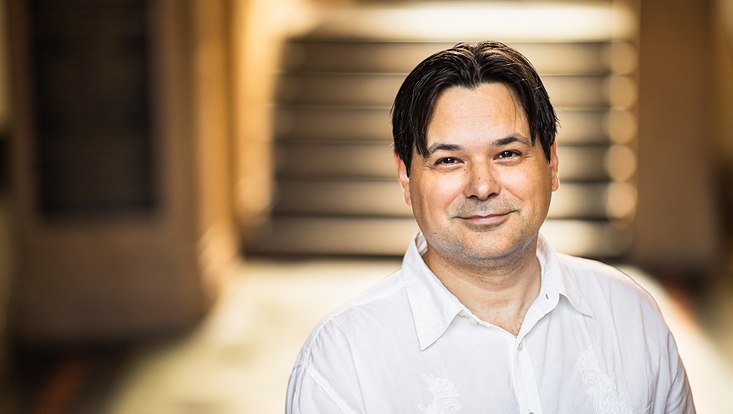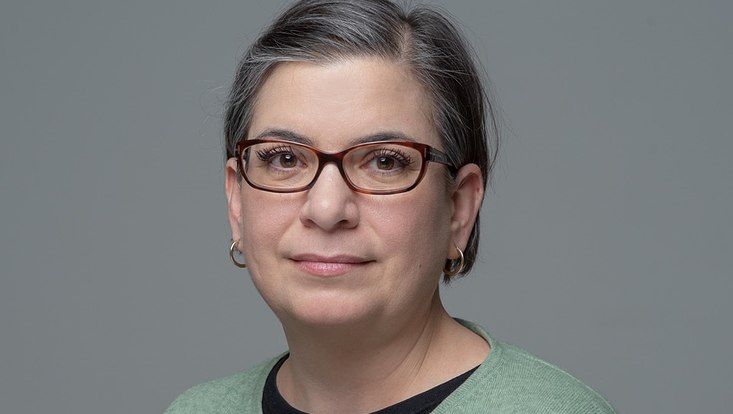Welcome aboard!“I Want To Open the Subject of ‘Migration, Biography, and Religion’ to a Larger Target Audience”Prof. Dr. Claudia Jahnel strengthens the humanities.
2 October 2023, by Jahnel/Red.

Photo: EKD/Jens Schulze
Every year, Universität Hamburg welcomes numerous new researchers. This series introduces them and their areas of research. This time: Theologian Prof. Dr. Claudia Jahnel.
Prof. Dr. Claudia Jahnel joined the Faculty of Humanities from Ruhr-Universität Bochum as a Professor for Evangelical Theology with a focus on World Christianity and Religious Studies.
My research area in 3 sentences:
Generally speaking, I am interested in what happens in the spaces between intercultural contact and between boundaries: the cultural, theological, and religious hybridizations, new forms of identity, the othering of “strangers”, negotiations of interpretive power, physical attributions of otherness, similarity and identity, the role of the senses and emotions in constructing proximity and distance.
My focus is on transregional religious discourses between Africa and Europe as well as Africa and Asia. I also focus on on autobiographical migration narratives and the question of how religion is perceived and understood, and changed, what they refer to as “doing religion.” And there is also a very current topic, that of cultural and religious knowledge and environmental justice.
This is how I explain my research to my family:
I ask what ideas “other” cultures have of religion, or what ideas of “nature” are behind films like Pocahontas, Avatar, Moana or Black Panther and why these films were so successful.
In Hamburg, the city and the University, I am looking forward to:
For my discipline, there is hardly a better place in Germany than Hamburg, with its international relationships and historical openness. It is no wonder that the subject here has continued to develop and enhance its international profile with many renowned professors in the field. The Mission Academy at Universität Hamburg has established a unique network of international theologians and up-and-coming religious scholars. My first impression suggests that this openness to the world is reflected in very constructive interdisciplinary collaboration.
I am particularly excited by the idea of cooperating with colleagues from the new Department of Religions and contact with the Asien-Afrika-Institut, as well as many other new cooperation opportunities. I am however also excited about the everyday intercultural and interreligious diversity in the city as well as the cultural life, including the amazing museums, collections, and—importantly—cinemas.
These are my plans at Universität Hamburg:
One very specific plan is to open up the subject of migration, biography, and religion to a broader target group, that is, provide something like a continuing education or certification course for anyone working in that field, e.g., people involved in education, administration, or church or charity work.
Apart from that, my dream is to work with various universities and nonuniversity institutions like the former ethnology museum to create spaces for shared reflection about what the globally-recognized Cameroonian philosopher Achille Mbembe called “future knowledges”: future knowledge and forms of knowledge between Africa, Asia, and Europe.
Many researchers and students, not just from the global south, but also from England or the Netherlands, have been pushing for the decolonization of our knowledge, to create space for a polyphonic knowledge system. Although I don’t want to dismiss our western knowledge system, global events, and most recently, climate change show that our western knowledge system has its dark side.
Even in what we call the west, we are in a knowledge crisis. How can we be aware of other knowledge systems, without perpetuating outdated ideas of academic superiority or simply appropriating indigenous knowledge as our own? I’m talking about a forum for diverse aesthetic narratives and thus ultimately about questions of sustainability, cultural resilience and survival.
This is why students should come to my lectures:
- because it will open up horizons beyond Hamburg and beyond Germany, while still touching on subjects and issues that are relevant to diverse communities,
- because they lead to critical examination of heretic depths, and strict religious and theological assertions of identity,
- because religion and its global transformation processes are very current (even in popular culture, such as the film “Dune”),
- because my lectures question (interpretative) power and seek to encourage postcolonial, anti-racist ways of thinking, and allow for engaged discussion,
- and because they also contextualize theology.
Look at the broader world around you: I work with these international facilities, universities, or institutions.
Without international relationships, my subject wouldn’t be possible. Specifically, I am currently working with universities in South Africa, Rwanda, and Kenya, on a mid-term project on environmental justice and religion. A digital conference took place in March 2022, with a follow-up conference this year in Stellenbosch, South Africa, funded by the German Research Foundation (Deutsche Forschungsgesellschaft) Bread for the World (Brot für die Welt) and some church institutions. We are working on a range of religious and post-colonial aspects of the Africa-Europe relationship with the Jesuit faculty in Abidjan/Côte d’Ivoire, the Centre for Intercultural Theology and Study of Religions in Salzburg, and other (intercultural) theological and religious studies partners in Germany.
The Academy of Mission at the University of Hamburg, who I have already worked with for a long time, maintains relationships with universities and educational institutions across the world, including in India, Myanmar, Fiji, Tanzania, Indonesia, and is an optimal partner in expanding international early career researcher development, perhaps in the form of a research training group. As a member of the joint advisory group between the World Council of Churches in Geneva and Penticostalism, I am also working with numerous theological faculties across the world.


